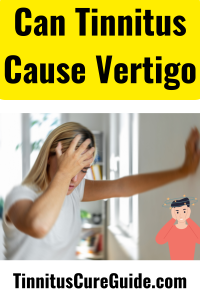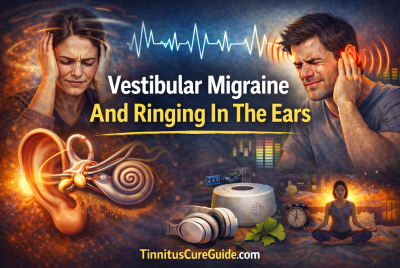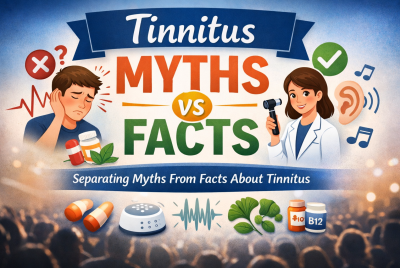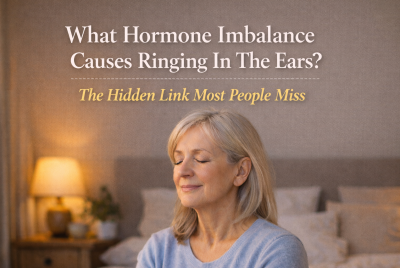Can Tinnitus Cause Vertigo
Discover The Link Between Tinnitus And Vertigo
Explore the connection. Can tinnitus cause vertigo? Dive deep into the symptoms, causes, and links between tinnitus and balance disruptions. As a researcher and advisor on hearing health, I want to address a common concern among individuals experiencing tinnitus: can tinnitus cause vertigo? Tinnitus and vertigo are two distinct conditions, but there is indeed a link between them. In this article, I will explore the relationship between tinnitus and vertigo, provide insights into their causes and symptoms, and offer helpful suggestions for managing these conditions effectively.
Introduction To Can Tinnitus Cause Vertigo
Before diving into the connection between tinnitus and vertigo, it’s essential to understand what these terms mean. Tinnitus refers to the perception of sound in the absence of an external source, often described as ringing, buzzing, or hissing in the ears. On the other hand, vertigo is a sensation of dizziness and spinning, making you feel off-balance.
Understanding Tinnitus
Tinnitus can stem from various causes, including exposure to loud noise, age-related hearing loss, earwax blockage, and certain medical conditions. Individuals with tinnitus often experience persistent ringing or buzzing sounds in their ears, which can significantly impact their quality of life. Sleep disturbances, difficulty concentrating, and increased stress levels are common consequences of tinnitus.
What Are Tinnitus Symptoms?
Tinnitus symptoms vary from person to person but commonly include the perception of ringing, buzzing, hissing, or other noises in the ears or head. Individuals with tinnitus may experience these sounds intermittently or continuously, and the intensity can range from mild to severe. Tinnitus can be accompanied by other symptoms such as difficulty concentrating, sleep disturbances, anxiety, and irritability. Some people may also notice changes in their hearing, such as sensitivity to certain sounds or a feeling of fullness in the ears. It’s essential to consult with a healthcare professional if you are experiencing tinnitus symptoms for a proper evaluation and guidance.
Can Tinnitus Affect Your Balance?
Tinnitus can affect your balance. Tinnitus refers to the perception of ringing or buzzing in the ears. While it primarily affects hearing, it can also be a symptom of issues with the inner ear, where our sense of balance originates. Specifically, the vestibular system in the inner ear helps control balance and spatial orientation. If tinnitus results from a problem with this system, such as an inner ear infection or Meniere’s disease, it can disrupt the balance. This disruption might manifest as dizziness, vertigo, or difficulty maintaining stability. Therefore, if someone experiences tinnitus alongside balance issues, they should consult a healthcare professional.
What Are the Causes of Tinnitus?
Tinnitus can have various causes, including exposure to loud noises, age-related hearing loss, earwax blockage, and certain medical conditions. Prolonged or repeated exposure to loud sounds, such as concerts or machinery noise, can damage the delicate structures of the inner ear and lead to tinnitus. Age-related hearing loss, known as presbycusis, is a common cause, as the auditory system naturally degenerates over time. Earwax blockage can also contribute to tinnitus by affecting the transmission of sound in the ear. Additionally, conditions like Meniere’s disease, otosclerosis, temporomandibular joint (TMJ) disorders, and head or neck injuries can trigger tinnitus. Identifying and addressing the underlying cause is essential for managing tinnitus effectively. Consultation with a healthcare professional is recommended for proper diagnosis and treatment.
Understanding Vertigo
Vertigo, on the other hand, has its own set of causes. Inner ear disorders, such as Meniere’s disease, benign paroxysmal positional vertigo (BPPV), and vestibular migraines, can trigger vertigo symptoms. People experiencing vertigo may feel a spinning or whirling sensation accompanied by nausea, imbalance, and difficulty focusing.
What Are Vertigo Symptoms?
Vertigo symptoms can be distressing and significantly impact a person’s daily life. The primary symptom of vertigo is a sensation of spinning, swaying, or dizziness, which can be accompanied by a loss of balance or coordination. Individuals may experience a spinning sensation even when they are not moving or feel like the surrounding environment is spinning around them. Other common symptoms include nausea, vomiting, sweating, headaches, and difficulty focusing. The duration and intensity of vertigo episodes can vary, ranging from brief episodes to prolonged spells that interfere with normal activities. If you are experiencing persistent or recurrent vertigo symptoms, it is advisable to consult with a healthcare professional for proper evaluation and guidance.
What Are The Causes of Vertigo?
Vertigo can have various causes, often stemming from issues in the inner ear or the central nervous system. The most common cause is benign paroxysmal positional vertigo (BPPV), where tiny calcium crystals in the inner ear become dislodged, causing a sensation of spinning. Other inner ear disorders, such as Meniere’s disease and vestibular neuritis, can also lead to vertigo. Certain medical conditions, including migraines, acoustic neuroma, and labyrinthitis, can be underlying causes. Additionally, head injuries, medications that affect the inner ear, and circulatory problems can contribute to vertigo. Identifying the specific cause of vertigo requires a thorough evaluation by a healthcare professional, who can recommend appropriate treatment options based on the underlying condition.
What Is The Most Common Cause Of Vertigo And Tinnitus?
The most common cause of vertigo and tinnitus is Benign Paroxysmal Positional Vertigo (BPPV). BPPV occurs when tiny calcium particles become lodged in the inner ear. These particles disrupt the ear’s ability to correctly sense head movements, leading to short, intense dizziness that may feel like spinning. Along with vertigo, some people also experience tinnitus, a ringing or buzzing in the ears. Another common cause is Meniere’s disease, a condition caused by fluid buildup in the inner ear. It can lead to vertigo, ear ringing, and hearing loss. If someone suspects they have BPPV or another ear-related issue, they should see a doctor.
The Connection Between Tinnitus And Vertigo
While tinnitus and vertigo are separate conditions, they can occur together due to shared causes and underlying mechanisms. Both conditions are commonly associated with inner ear disorders. When tinnitus is caused by an underlying condition affecting the vestibular system, it can lead to vertigo episodes.
Some medical conditions, such as Meniere’s disease, can manifest with both tinnitus and vertigo. Meniere’s disease is characterized by recurring episodes of vertigo, fluctuating hearing loss, tinnitus, and a feeling of fullness in the affected ear. Understanding these connections can help individuals with tinnitus-related vertigo seek appropriate treatment and management strategies.
Managing Tinnitus-Related Vertigo
If you experience tinnitus-related vertigo, seeking professional help is crucial. An audiologist or an ear, nose, and throat (ENT) specialist can assess your condition and recommend suitable treatment options. They may perform tests to identify the underlying cause of your symptoms and develop a personalized plan for managing both tinnitus and vertigo.
Lifestyle Changes for Managing Tinnitus-Related Vertigo
In addition to professional assistance, lifestyle changes can play a significant role in managing tinnitus-related vertigo. Avoiding triggers, such as loud noises and excessive caffeine, can help reduce the frequency and intensity of vertigo episodes. Relaxation techniques, such as deep breathing exercises and meditation, can assist in managing stress and anxiety, which often exacerbate both tinnitus and vertigo symptoms.
Loud Noises
Avoiding loud noises can help manage tinnitus-related vertigo by preventing further damage to the auditory system and reducing the risk of triggering vertigo episodes. Loud noises can worsen tinnitus symptoms and increase the likelihood of vertigo attacks. By protecting your ears from loud sounds through the use of earplugs or noise-canceling headphones, you can minimize the impact of noise-induced tinnitus and potentially reduce the frequency and severity of vertigo episodes associated with your condition.
Excessive Caffeine
Avoiding excessive caffeine can aid in managing tinnitus-related vertigo by minimizing potential triggers for vertigo episodes. Excessive caffeine consumption can stimulate the nervous system and potentially exacerbate symptoms such as dizziness and imbalance. By reducing or eliminating caffeine intake, individuals with tinnitus-related vertigo can experience fewer instances of vertigo and maintain better control over their condition. It is advisable to monitor caffeine intake from sources like coffee, tea, energy drinks, and certain medications and make adjustments as needed to support overall symptom management.
Relaxation Techniques
Relaxation techniques can be beneficial in managing tinnitus-related vertigo by reducing stress and anxiety, which are known to exacerbate symptoms. Engaging in relaxation techniques such as deep breathing exercises, meditation, yoga, or mindfulness practices can help promote a sense of calm and relaxation. By managing stress levels, individuals may experience a reduction in tinnitus and vertigo symptoms. Incorporating regular relaxation techniques into a daily routine can contribute to overall well-being and provide a positive impact on tinnitus-related vertigo management.
Treatment Options For Tinnitus-Related Vertigo

Treatment options for tinnitus-related vertigo can vary depending on the underlying cause and individual circumstances. Seeking professional help from an audiologist or an ear, nose, and throat (ENT) specialist is essential for proper evaluation and guidance. Treatment may involve a combination of approaches. Medications such as antihistamines, anti-anxiety drugs, or certain sedatives can be prescribed to alleviate symptoms during vertigo episodes. Physical therapy exercises and vestibular rehabilitation can help improve balance and reduce vertigo. Surgical interventions may be considered for severe or unresponsive cases in some cases. Additionally, lifestyle changes, stress management techniques, and avoiding triggers like loud noises or excessive caffeine can also effectively manage tinnitus-related vertigo. A personalized treatment plan should be developed based on individual needs and in consultation with healthcare professionals.
Prevention And Self-Care Tips
Prevention is always better than cure when it comes to tinnitus and vertigo. Protecting your hearing from loud noises and using ear protection devices can help prevent tinnitus. It’s also essential to maintain a healthy lifestyle, including regular exercise, a balanced diet, and sufficient rest, as these factors contribute to overall well-being and can positively impact tinnitus and vertigo symptoms.
Managing stress and anxiety is crucial, as they can exacerbate both tinnitus and vertigo. Engaging in activities that help you relax, such as yoga or spending time in nature, can be beneficial. Remember to prioritize self-care and take breaks when needed to maintain optimal mental and physical health.
Seeking Professional Help
It is advisable to seek professional help for tinnitus and vertigo if you experience persistent or recurrent symptoms that significantly impact your daily life. If tinnitus or vertigo lasts for an extended period, worsens over time, or is accompanied by other concerning symptoms such as hearing loss, severe dizziness, or difficulty with balance, it is essential to consult with a healthcare professional. Additionally, if you are unsure about the underlying cause of your tinnitus or vertigo, seeking professional evaluation can help identify any potential underlying medical conditions and guide you towards appropriate treatment options for effective management.
FAQs About Can Tinnitus Cause Vertigo
1. Can tinnitus go away on its own?
In some cases, tinnitus may resolve on its own, especially if it is caused by temporary factors like exposure to loud noise. However, persistent tinnitus should be evaluated by a healthcare professional.
2. Can stress worsen tinnitus and vertigo?
Yes, stress can exacerbate both tinnitus and vertigo symptoms. Relaxing stress and seeking emotional support can help alleviate these symptoms.
3. Are there any natural remedies for tinnitus-related vertigo?
While natural remedies may relieve tinnitus and vertigo, it’s important to consult with a healthcare professional before trying alternative treatments. They can guide you based on your specific condition.
4. Can medications completely cure tinnitus and vertigo?
Medications can help manage the symptoms of tinnitus and vertigo, but they may not provide a complete cure. Treatment plans often involve a combination of approaches tailored to the individual’s needs.
5. Is tinnitus-related vertigo a permanent condition?
Tinnitus-related vertigo can be chronic, but its severity and frequency can vary. Seeking professional help and implementing appropriate management strategies can help individuals live a fulfilling life despite the challenges posed by these conditions.
Can Tinnitus Cause Vertigo – Conclusion
In conclusion, while tinnitus and vertigo are distinct conditions, they can coexist due to shared causes and mechanisms. Understanding the connection between tinnitus and vertigo is essential for seeking appropriate treatment and managing these conditions effectively. By seeking professional help, implementing lifestyle changes, and practicing self-care, individuals experiencing tinnitus-related vertigo can improve their quality of life and minimize the impact of these conditions.
Disclaimer
This article is for informational purposes only and does not substitute professional medical advice. Always consult a licensed healthcare provider before beginning new treatments, supplements, or exercise programs for tinnitus or related conditions.






